‘We have often seen our freedom of speech come under threat’: Young Democratic and Republican voters speak out
Blaine Lewis-Thompson was on a FaceTime call with friends last Saturday morning, lamenting how long it was taking for the Nov. 3 presidential election to deliver an outcome, when he learned that major news organizations had projected former Vice President Joe Biden as president-elect.
Lewis-Thompson, a fourth-year student at Cheyney University in Pennsylvania, immediately took to Instagram Live
FB,
to celebrate, and began blasting music.
Pennsylvania’s decisive role in delivering the presidency to Biden was particularly significant to Lewis-Thompson. He’d spent the last several months organizing college students in the state to get out the vote as a senior fellow for Rise, an advocacy organization focused on college affordability and other youth and student issues.
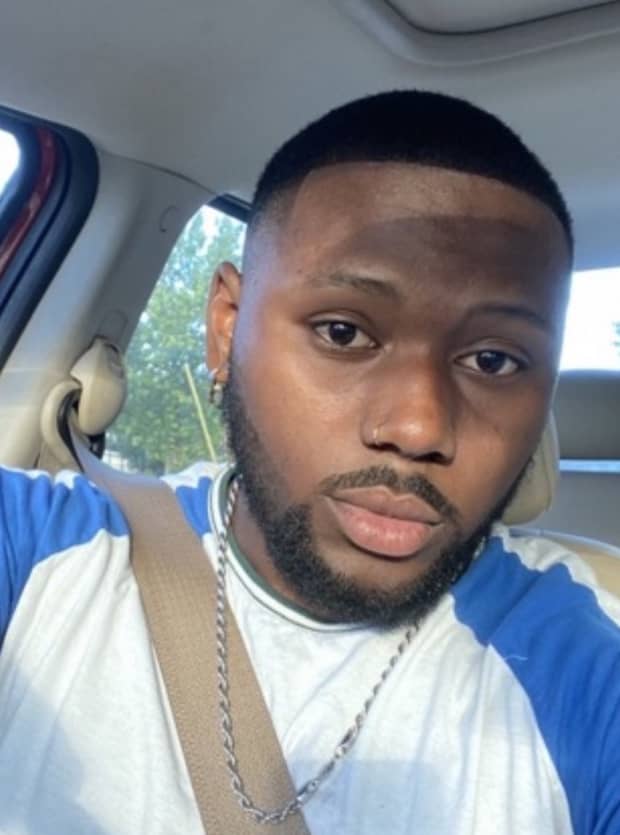
Blaine Lewis-Thompson helped get out the vote among college students.
He felt “complete” after all the hard work that he and the organizers put in, he said that Saturday afternoon. “This is how you get the results that you want,” he said. “This is how politics works.”
A surge in youth-voter turnout likely helped propel Biden to victory, but young voters showed up for both candidates. Despite the COVID-19 pandemic — which changed the voting experience on college campuses and nationwide — between 50% and 52% of eligible voters ages 18 and 29 cast a ballot in this election, according to the Center for Information and Research on Civic Learning and Engagement at Tufts University. In 2016, CIRCLE estimated that youth turnout was between 42% and 44%.
“While President-elect Joe Biden won the youth vote by a 25-point margin, more than a third of young voters (36%) supported President Trump,” according to CIRCLE.
Young people had ‘a pretty strong effect’ on the election outcome
“It was abundantly clear that young people had a pretty strong effect, not only on the federal election results this year, but also had an effect on the whole election cycle,” said Abby Kiesa, the deputy director of CIRCLE.
In June of this year, there was already evidence from a CIRCLE poll that more young people were volunteering for campaigns and donating money than in previous election cycles, Kiesa said.
By August, youth voter registration had exceeded the levels of early November 2016. In addition, it was clear by October that early and absentee voting among younger voters would “blow away” numbers from the 2016 election, she said.
Given the pandemic, it made sense that those numbers would be higher than in previous election cycles, but in some areas they exceeded expectations. For example, young voters in Texas cast more ballots before Election Day than they did in the entire 2016 presidential election, Kiesa said. CIRCLE projects that when all the votes are counted, young voter turnout will have increased by seven or eight percentage points from the 2016 election.
Issues like climate change, racial justice and the coronavirus pandemic were top-of-mind matters for young voters this election cycle, Kiesa said. Nearly 80% of those who responded to a June CIRCLE poll said the COVID-19 pandemic helped them realize how politics impacts their everyday lives.
Similar to Democrats and Republicans overall, younger Biden voters said the pandemic was the most important problem facing the country, while younger Trump voters said it was the economy, according to CIRCLE. Younger Trump voters held different views from those of their older counterparts: They were more likely to be concerned about racism, climate change and restricting abortion access than older Trump voters.
Both young Democrats and Republicans were inspired by the election outcome
Though her pick for president didn’t win, Emma Scott felt energized by the experience of this election. As the chair of the South Carolina College Republicans, she oversees all of the chapters of the organization in the state.
In the lead-up to the election, she helped organize phone-banking competitions between college chapters for Sen. Lindsey Graham and an effort that saw 1,400 college students descend on Charleston as part of a door-knocking campaign for Congresswoman-elect Nancy Mace. Both candidates won their elections, and Mace’s win flipped that district’s seat to Republican control from Democratic.
“Most College Republicans are proud of the work that they have done the past couple of months,” she said.
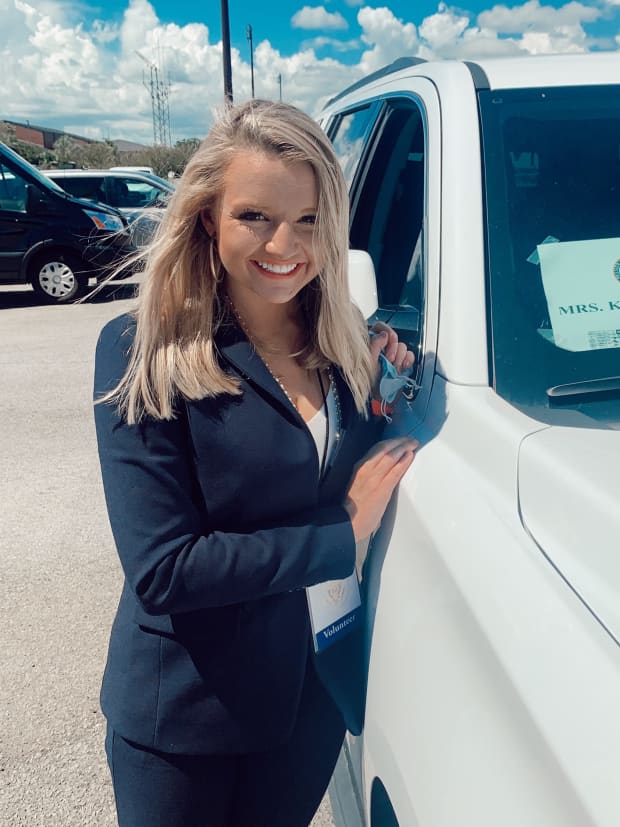
Emma Scott of the South Carolina College Republicans got the chance to vote for a role model in this election.
For Scott, a political-science major at the University of South Carolina, the chance to cast her ballot this election cycle was particularly meaningful — it was her first presidential election, and she also got the chance to vote for Mace, whom she worked for as a page in the state house. “She’s a role model for me,” Scott said. “I almost cried.”
Scott said issues like “constitutional values” as well as the economy — for example, “jobs, are they going to stay here, are they going to go abroad?” — influenced her support of Trump and other Republicans. She said she’ll be watching lawmakers at the state and federal levels to ensure “policy is going through” that “is a reflection of upholding constitutional values instead of trying to take them away.”
To her, those values include the Second Amendment, religious liberty and freedom of speech. “I think it is important that those seeking public office always strive to uphold the principles embedded within our Constitution and the ideas laid out by the Founding Fathers.” She added, “I also believe that in recent years we have often seen our freedom of speech come under threat, and I always look for candidates who value our right to free expression.”
Kyle Ogle also said the experience of voting this year made him hopeful about the political process more broadly. Ogle, who recently graduated from Old Dominion University in Virginia with a degree in accounting and a minor in business analytics, took a day off work after the election to mentally process the returns.
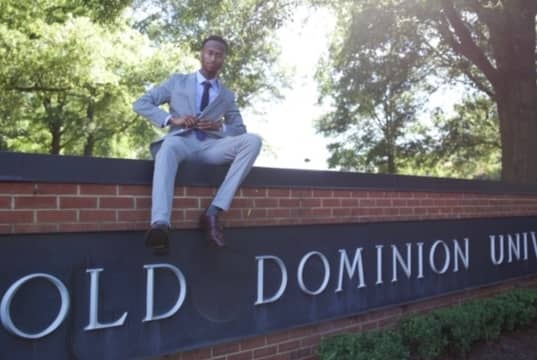
Kyle Ogle recently graduated from Old Dominion University in Norfolk, Va.
In the days in between when votes were cast and the outcome was apparent, Ogle said he felt a bit anxious and tense.
The outcome of the election and the apparent success of voter-registration efforts, including those run by Stacey Abrams — a Democrat and voting-rights advocate who served in the Georgia House of Representatives from 2007 to 2017 and achieved nationwide recognition in her 2018 run for governor — and other organizers, gave Ogle more confidence in the political system, he said.
“It just gives me a sense of hope that your vote actually counts and it actually matters,” he said. “You have the power to change what happens in this country, and this election has proved that to me.”
Young voters of color were key in swing states
For Alex Huskey, it was a “new feeling” to watch his home state of Georgia become the subject of national attention. Huskey, 21, grew up in Summerville, Ga. and is now a junior at the University of Georgia, where he’s chair of school’s chapter of the College Republicans.
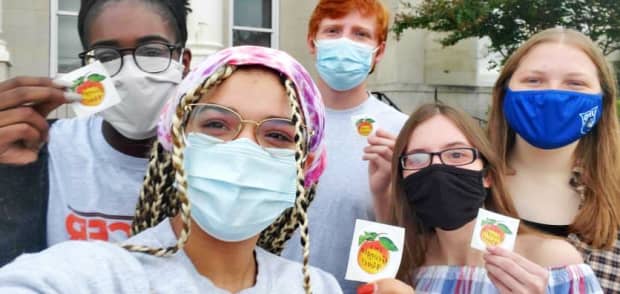
Alex Huskey, back right, after heading to the polls with friends to cast their ballots.
The tight margins in the state were palpable in the lead-up to the election, Huskey said. Every time he turned on the television there was an ad for one of the various Senate candidates. The state, unusually, had two Senate seats on the ballot, and one of them had more than 20 candidates in the running.
“There’s just already been a ton of money spent on Senate races here,” he said, “I can only imagine what that’s going to look like now that the control of the Senate hinges on Georgia.” Kelly Loeffler and David Perdue, Republican incumbents, are facing Democratic challengers Raphael Warnock and Jon Ossoff in a Jan. 5 runoff election.
There’s not much Huskey and his fellow College Republicans can do to affect the outcome of litigation over the presidential election as the Trump campaign challenges voting procedures and outcomes, but his organization is “definitely going to be doing everything we can,” to help during the Senate runoff, including by connecting interested students with opportunities to help those campaigns, Huskey said.
“They’re very driven,” Huskey said of his fellow College Republicans, “And they want to see Senators Perdue and Loeffler win re-election.”
Regardless of who controls Congress come January or whether any of the Trump legal claims gains traction, Huskey said he’ll be watching closely to see how lawmakers deal with the economy and the U.S. Supreme Court — two issues that are key to his identity as a Republican.
Huskey, a political-science major who is also pursuing a master’s degree in public administration, has always been interested in and involved with politics, he said. But what made this election different — his first chance to cast a vote for president — was the level of participation among his peers. He went with friends to cast their ballots together.
“A way it felt different is that more people my age were excited to go to the polls and excited to vote,” Huskey said of this election.
Asya McDonalds, a 21-year-old college student living with her family in Alpharetta, Ga., also watched with excitement and surprise as her state became a contentious battleground.
“I never thought Georgia would be a blue state,” she said. Biden appears to have won Georgia — the first Democratic candidate for president to do so since Bill Clinton — but the state is currently in the midst of a recount to ensure the accuracy of the votes.
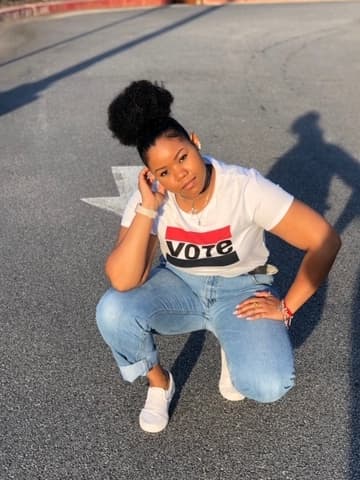
Asya McDonalds didn’t believe that the race in Georgia, where she lives, would wind up being so close.
Young voters contributed to Biden’s advantages in many swing states, according to CIRCLE. In Michigan, young voters gave Biden an edge of 194,000 votes; in Pennsylvania, where Lewis-Thompson was an organizer, 154,000 more young voters cast their ballots for Biden than for Trump; and in Georgia, Biden had an edge among youth voters of 188,000.
Young voters of color were particularly crucial to Biden’s success in these states. For example, in Georgia, 90% of Black youth voted for Biden and in Pennsylvania 85% of young voters of color voted for Biden, compared to roughly 52% of young white voters, according to CIRCLE data.
For McDonalds, watching Sen. Kamala Harris of California become the first Black and Asian-American woman vice president only added to the excitement of watching the tight Georgia contest, she said.
“It means the world, honestly,” she said of Harris’s election. “There is not a glass ceiling at this point because everything is kind of capsizing,” McDonalds, who hopes to be a lawyer or a journalist, added.
Sapphire Allen-Scruggs, a 21-year-old who graduated from Ramapo College of New Jersey this spring, agreed. She was in sixth grade when Barack Obama was elected president and was happy at the time to see a Black man hold the office.
“But now to see a Black woman — although she’s not president — this is someone who looks like me,” Allen-Scruggs said. “This is something I will be able to tell my future children, this is what happened in 2016, and now this is what happened in 2020.”

Sapphire Allen-Scruggs celebrated the historic nature of a Kamala Harris vice presidency.
‘The next step is holding him accountable’
Though Lewis-Thompson is also excited that Biden and Harris are set to assume the nation’s top jobs, he believes his work as a youth organizer is just beginning.
Lewis-Thompson knows firsthand the experience of coping with COVID-19 — he had the virus himself — and so he’ll be particularly interested to see how Biden deals with the virus as well as his approach to making health care more affordable.
Lewis-Thompson said he’ll also be watching to see how Biden approaches police reform. “Me being a Black man and so many other Black men dying and being killed by police officers,” Lewis-Thompson said, has motivated him to make “sure we have situations where that’s actually decreased.”
Lewis-Thompson is hoping to go into politics himself one day and to address issues like racial inequities in education and wealth. “It doesn’t end here,” Lewis-Thompson said of his activism. “The next step is holding him accountable.”



